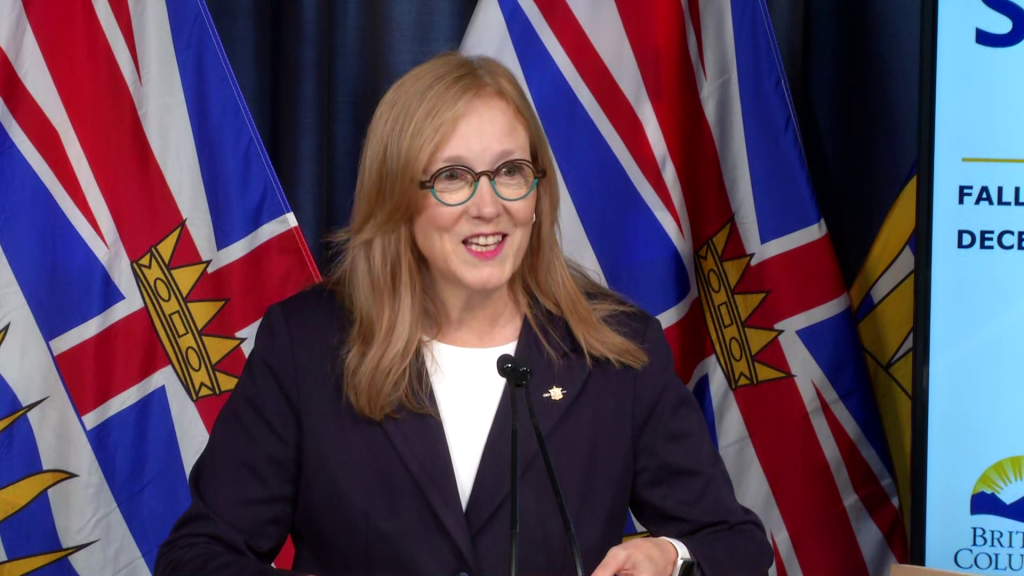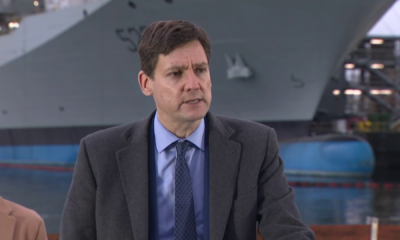Local News
Can B.C.’s budget cushion shock of Trump’s tariff earthquake?

British Columbia’s government has had plenty of early warning about the economic earthquake — epicentre, Washington, D.C. — that could rock the province on the same day Finance Minister Brenda Bailey delivers her first budget in Victoria.
While the exact magnitude remains uncertain, experts and economists say the impact of U.S. President Donald Trump’s threatened tariffs will have Bailey handing down one of the most consequential budgets for the province in recent memory on Tuesday.
It’s the same day that Trump has said he will impose sweeping tariffs on Canadian exports, in what Premier David Eby has called a “declaration of economic war.”
The province has already cancelled a promised $1,000 grocery rebate and frozen some public-sector hiring as it braces for a trade war against what Eby called an “outsized and significantly more powerful foe.”
Eby has admitted that the frequent and unpredictable threats from the White House have posed a challenge for Bailey, potentially affecting everything from royalty and tax revenues to demand on social services in the province.
Jairo Yunis, director of policy with the Business Council of British Columbia, said members are anxious about the tariff uncertainties, and many are looking to the budget to “walk the talk” of strengthening B.C. as a value proposition for investors.
Stewart Prest, a political science lecturer at the University of British Columbia, said last week’s throne speech — evoking wartime imagery with references to Winston Churchill, D-Day and the fight against Nazism — clearly indicates this year’s budget will be anything but business as usual.
“While the form and nature of the fight will be quite different here — we’re not talking about a shooting war, thankfully — we are talking about fundamental defence of sovereignty of the country and B.C.’s role in that,” Prest says. “So I think that that’s an appropriate frame, unfortunately.
“There are still things that need to be done that are the same as needed to be done yesterday and last year … but all this is going to have to be recast within the frame of defending British Columbia (and) Canada’s sovereignty at the same time.”
Even without Trump’s threats, the province had been going into the budget carrying a record deficit, forecast to end up at $9.4 billion this fiscal year.
Bailey had said in December that the ballooning deficit would not change the government’s intention to make “smart, targeted investments” to grow the economy, rather than cutting services.
But that was before Trump took office.
Speaking on Friday, Eby said the uncertainty from the United States made it hard on businesses planning their future in a nebulous economic environment.
Eby said the province plans to “support certainty for B.C. businesses” as a key countermeasure, adding that those plans won’t change whatever the timing and magnitude of Trump’s tariffs.
“We’re acting as if the tariffs are here,” he said. “We took the 30 days from the initial date the president gave to March 4, when he’s saying he’s going to bring them in again now. We haven’t wasted any of that time.
“We’ve used all that time to push forward our responses. And if there’s another extension, we’ll use that time too, and if there’s not, then we’ll continue.”
The Opposition Conservatives’ jobs and economic development critic accused the NDP government last week of trying to “wrap themselves in the flag” while the province’s economy deteriorated.
“Real leadership means standing up for our people and our economy all the time, not just saying ‘God bless Canada’ when it’s politically convenient,” Gavin Dew said last Monday, the first day of the legislative session.
He cited the closing of trade offices and creation of an investment environment in B.C. that he called “risky and slow.”
“We came into this fight weak. Under the NDP, B.C. has become less competitive and less prepared for economic shocks. For years, this government weakened our ability to compete and our ability to grow our economy.”
Jock Finlayson, chief economist for the Independent Contractors and Businesses Association, said Bailey’s task with the budget is an unenviable one, given B.C.’s deficit. Her options to mitigate the effects of possible tariffs are “quite limited,” he said.
“I think B.C. is hamstrung because of the fiscal mismanagement over the previous two years,” Finlayson said. “If they were running a budget balanced, or surplus, then they would have more scope to maybe spend another five or 10 billion dollars on discretionary, short-term programs to help industries or communities.
“They’ve spent all the money that you would like to be able to spend in a crisis,” he said. “They spent it all in a pre-crisis environment. So now we face a crisis, and the cupboard is essentially bare.”
Finlayson said the province should be pursuing everything possible to facilitate new projects and private-sector investment “anywhere and everywhere where it can be brought to fruition.”
Yunis, from the Business Council of British Columbia, agrees.
“It’s a huge risk if we don’t get this right,” he says. “The Trump administration is basically making the case for Canadian businesses to go to the U.S., and we’ve seen it within the forestry sector.
“We might see that happen in other natural resource industries and all the trade-exposed industries such as manufacturing .… So there are few constraints the government has right now, but we do believe that the government is listening, that finally they’re open to these ideas of strengthening the economy.”
B.C.’s budget created with tariffs in mind: finance minister
Speaking less than 24 hours ahead of tabling the budget, Bailey explained that the ministry has built Tuesday’s budget “with the expectations that tariffs may come” on the same day, she said on Monday.
“We know that this uncertainty is already playing in the economy. We see that. We’ve seen that in regards to a reduction of projections of GDP growth from the Economic Forecast Council, for example,” she told reporters.
“And so this budget is designed to provide us initial steps that we can take and flexibility for us to move forward. The budget is really focused on protecting core services for people, on sharpening our pencil, on government spending, and importantly, on growing the economy, that’s the approach that we’ve taken,” she added.
While Bailey explains that the government doesn’t know what Trump will decide to do — “day to day or even hour to hour” — the government is tabling a budget that “meets the moment.”
Bailey says the government is “standing strong” and defending British Columbian workers and industries against the tariffs.
“We are working with the federal and other provincial governments, as well as pursuing our own strategies to ensure that we’re deepening and expanding our trade relationships with other countries around the world,” she said.
The finance minister acknowledges that the threat of the tariffs has already had an impact on businesses and B.C. residents, and [it is] “already hurting our economy and has industries bracing for impact. It’s crucial that we get business labor and indigenous leadership and government around the table, and we’re doing just that.”
“We all have to stand together. But fortunately, B.C. has what it takes. We are a great province with skills and hard-working people and a diversified and inclusive economy, and tomorrow you’re going to see a budget that’s about setting us up to succeed regardless of what happens with tariffs,” she explained.
“We’re protecting services, we’re growing the economy, and we’re focusing our spending three big priorities that work hand in hand, to defend our quality of life.
“I expect that uncertainty and disorder will be with us and our friends in America for the next four years. We could all be stronger together across the entire continent, but instead, we will have to fight tariffs and stay strong together in British Columbia and across the true north, strong and free.”
With files from Raynaldo Suarez.












